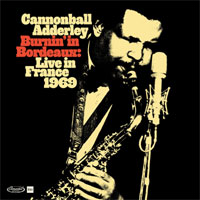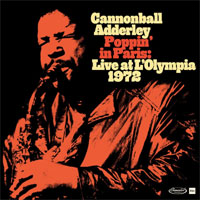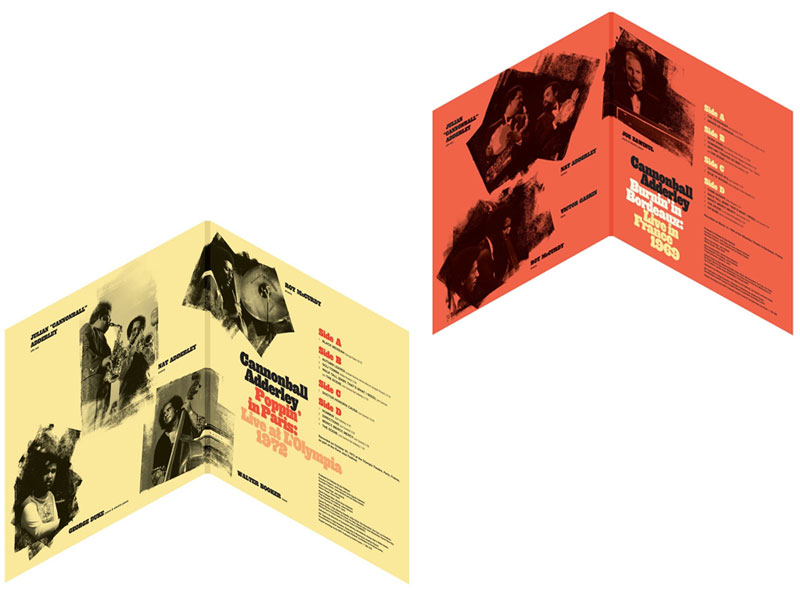Cannonball Adderley • Burnin' in Bordeaux: Live in France 1969
Cannonball Adderley • Poppin' in Paris: Live at L'Olympia 1972 Elemental Music 5990549
t's difficult to consider Julian "Cannonball" Adderley's career, which spanned just two decades, without immediately thinking of his greatest recorded achievements -- and truly great they are. He played on Kind of Blue and headlined Somethin' Else -- both jazz classics of the first rank. But he was also responsible for many other important recordings, my faves being his Riverside sets with Milt Jackson and Bill Evans -- Things Are Getting Better and Know What I Mean?, respectively. Adderley's involvement with a recording almost guaranteed its popularity and often its significance. In this, he was in select company as a musician and an artist. Kind of Blue and Somethin' Else mark the genesis of modal jazz and the apex of hard bop, underscoring Adderley's versatility. Burnin' in Bordeaux and Poppin' in Paris, two live sets from France, do the same while also show Adderley in top form, both as an alto saxophonist and leader. They are very much artifacts of their time. Burnin' in Bordeaux mixes together styles and structures over the course of nearly a hundred minutes of stirring music. In addition to Adderley, there is Joe Zawinul on piano, Victor Gaskin on bass, Roy McGurdy on drums, and Nat Adderley -- Cannonball's brother -- on cornet. They work through a set of mostly covers, including "Mahna de Carnival," which Vince Guaraldi made famous on Jazz Impressions of Black Orpheus, and "Work Song," which Nat Adderley wrote and played on his well-known Riverside album of the same name, along with Cannonball's "Mercy, Mercy, Mercy." The set has leisurely pacing, with the leader addressing the audience multiple times -- to announce the upcoming number or point out the contributions of his band mates, all with good-natured charm. Poppin' in Paris is from only three years later, but it is, for the most part, a rather different set. The cuts are longer and more free-form. To my ears, the music displays the seismic effect of Bitches Brew, the seminal 1970 Miles Davis recording that launched jazz-rock fusion. It heavily influenced groups such as Mahavishnu Orchestra, Chicago and Steely Dan, along with virtually every serious jazz musician alive at the time. You can hear it in the music at L'Olympia -- in the long cuts that open both LPs, as well as in some of the shorter and more focused numbers. The Adderley brothers and Roy McCurdy play on both sets, but George Duke is on acoustic and electric piano here, and Walter Booker plays bass. The recording comprises two sets, both from the Paris Jazz Festival, and kick off with "Black Messiah" and "Doctor Honoris Causa." The first is over twenty minutes and the second is nearly that long, and both display some of the probing, driving, rock-like jamming that began to color the music of the day. One cut, "Mercy, Mercy, Mercy," is played in the Bordeaux and Paris concerts ("The Scene," also repeated, is an outro signaling the end of sets), but the differences between the versions are not as indicative as the entirety of the two albums. Poppin' ends with more pleasantries from Cannonball Adderley, underscoring what an exceedingly nice guy he seemed to be.
These are two more musical finds from Zev Feldman, "the Jazz Detective," who has earned a new nickname, King of Record Store Day, due to so many of his discoveries being released on that day in April, or Black Friday in November. Both of these sets were released in conjunction with the Cannonball Adderley estate, the Elemental Music label, and the Institut national de l'audiovisuel (INA) in Paris, which provided the tapes. Matthew Luttans did the mastering for vinyl at The Mastering Lab. Booklets are expected for such releases, and these feature articles from musicians and critics as well as photos from the concerts and of the cans in which the tapes were stored. The Bordeaux recording (and probably the venue) is more intimate, while L'Olympia seats nearly 2500. The sound of the two concerts reflects this difference, with the Bordeaux set sounding more up front and visceral and the Paris shows sounding more distant. I would still say the sound of both is very good, with the Bordeaux recording sounding more immediate and vivid. I suspect the LPs were pressed at Memphis Record Pressing, where other recent Zev Feldman projects have been pressed. They are thick, flat, shiny and exceptionally quiet. Twenty-nine hundred and fifty copies of each were released on Record Store Day, April 20, 2024, but both are still available from participating stores. Among the things these two recordings show is the
progression of a great musician beyond his best-known recordings. Adderley died in 1975,
so he would live only a handful of years after these concerts. Both are fitting tributes
to him, his artistic vision, and his kindliness on stage. |



